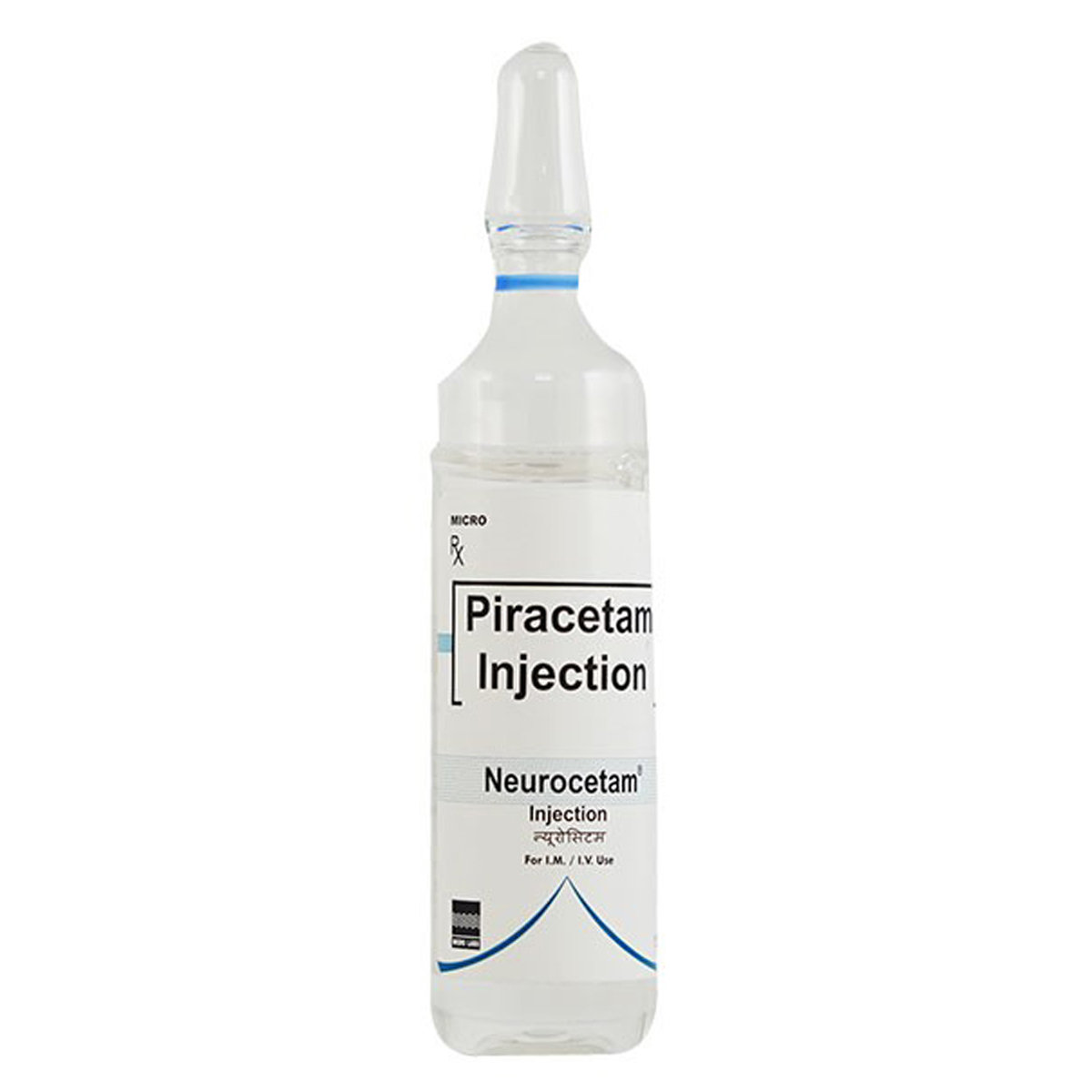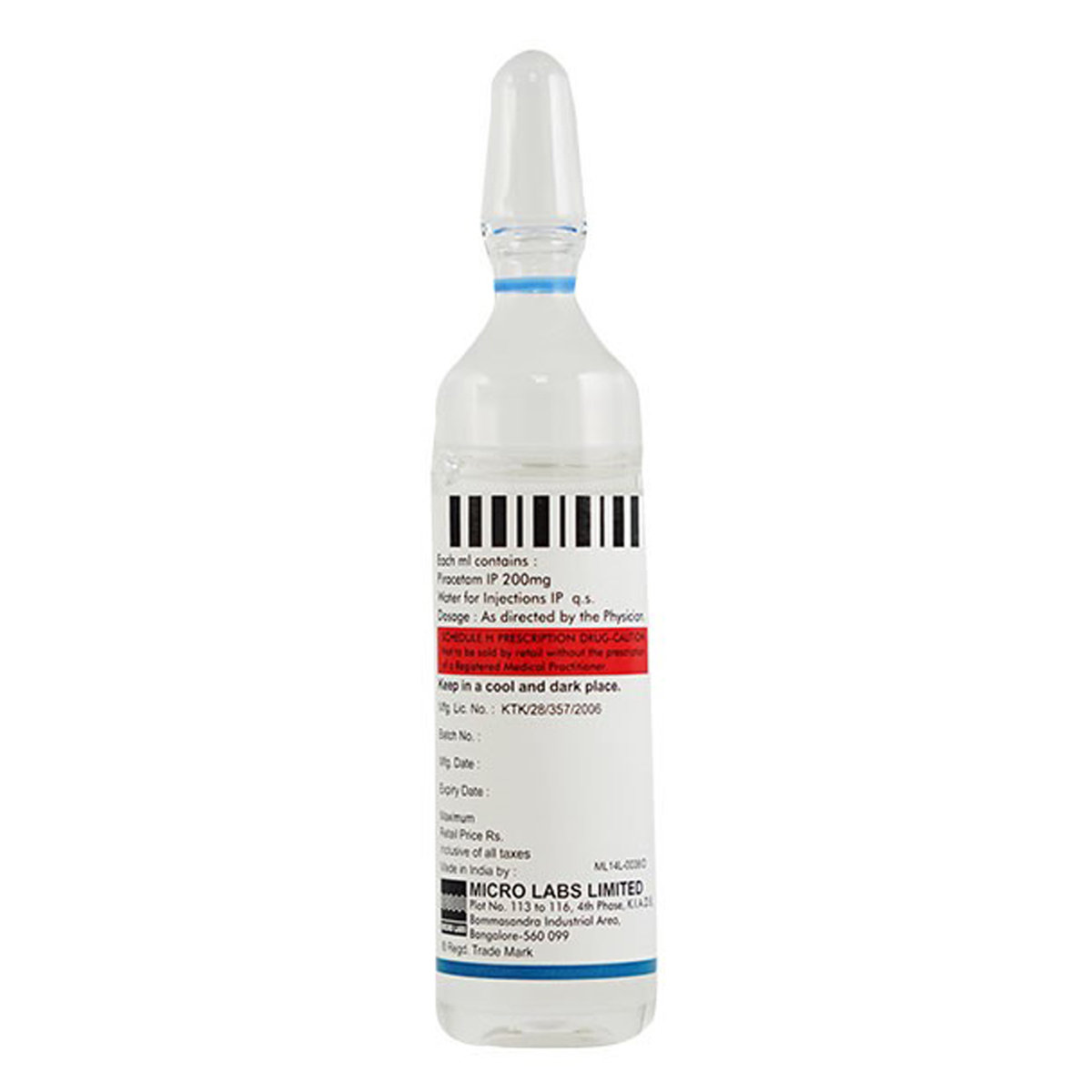Neurocetam Injection 15 ml
MRP ₹210.5
(Inclusive of all Taxes)
₹21.1 Cashback (10%)
Provide Delivery Location
Online payment accepted
 Prescription drug
Prescription drugWhats That
Composition :
Manufacturer/Marketer :
Consume Type :
Expires on or after :
Return Policy :
About Neurocetam Injection
Neurocetam Injection belongs to a group of medicines called GABA analogues used to treat myoclonus (a movement disorder). Additionally, Neurocetam Injection is also used to treat memory disorders, vertigo, and dyslexia (learning disorder) in children above 8 years.
Neurocetam Injection contains 'Piracetam' that acts on the brain and nervous system, thereby protecting against shortness of oxygen. It also improves the activity of a chemical messenger called acetylcholine which helps in communication between brain cells.
In some cases, Neurocetam Injection may cause side effects such as diarrhoea, nausea, vomiting, headache, abdominal pain, and pain at the site of injection. Consult your doctor if you experience any of these side effects persistently.
Consult your doctor if you are pregnant or breastfeeding. Consumption of alcohol is not recommended during treatment with Neurocetam Injection. Avoid driving or operating machinery as Neurocetam Injection may cause drowsiness, dizziness and fatigue. Neurocetam Injection is not recommended for children below 8 years.
Uses of Neurocetam Injection
Directions for Use
Key Benefits
Neurocetam Injection is a nootropic drug which belongs to a group of medicines called GABA analogues. Neurocetam Injection is used to treat myoclonus (a movement disorder). Additionally, Neurocetam Injection is also used to treat memory disorders, vertigo, and dyslexia (learning disorder) in children above 8 years. Neurocetam Injection acts on the brain, and nervous system thereby protecting against shortness of oxygen. It also improves the activity of a chemical messenger called acetylcholine which helps in communication between brain cells.
Storage
- Tell your doctor immediately if you experience symptoms of Nervousness, such as anxiety, jitteriness, or an increased heart rate, after taking medication or adjusting your medication regimen.
- Your doctor may adjust your medication regimen to alleviate symptoms of Nervousness. This can include switching to a different medication, reducing the dosage, or temporarily stopping the medication. Your doctor may also recommend alternative techniques like relaxation, mindfulness meditation, or journaling. These techniques can help reduce anxiety and Nervousness.
- Practice stress-reducing techniques, such as deep breathing exercises, yoga, or journaling, to help manage Nervousness.
- Engage in regular physical activity, such as walking or jogging, to help reduce anxiety and improve mood.
- Your doctor may advise considering cognitive-behavioural therapy (CBT) or other forms of talk therapy to address underlying anxiety or Nervousness.
- You should maintain regular follow-up appointments with your doctor to monitor nervousness symptoms, adjust treatment plans as needed, and discuss any concerns or questions.
Drug Warnings
Do not take Neurocetam Injection if you are allergic to any of its contents; if you have/had end-stage kidney disease, Huntington's chorea disease (degeneration of nerve cells in the brain) or brain haemorrhage. Inform your doctor if you have bleeding problems or kidney dysfunction. Consult your doctor if you are pregnant, planning for pregnancy or breastfeeding. Avoid driving or operating machinery as Neurocetam Injection may cause drowsiness, dizziness and fatigue. Neurocetam Injection is not recommended for children below 8 years. Keep your doctor informed about your health condition and medications to rule out any interactions.
Drug-Drug Interactions
Drug-Drug Interactions
Login/Sign Up
Drug-Food Interactions
Drug-Food Interactions
Login/Sign Up
Diet & Lifestyle Advise
- Maintain proper weight by following a healthy diet.
- Exercise regularly as it helps in less cognitive decline and brain volume loss.
- Avoid smoking and alcohol consumption.
- Try to avoid stress by practising meditation or yoga.
- Include fruits and vegetables in your diet as they contain antioxidants.
- Avoid late-night exercises as they can increase muscle twitches.
- Create a bed time routine as it helps in relaxation and stress reduction.
- Follow a healthy lifestyle as it helps in improving overall health and possibly protects the brain.
Side Effects of Neurocetam Injection
- Diarrhoea
- Nausea
- Vomiting
- Headache
- Abdominal pain
- Pain at the site of injection
Habit Forming
Therapeutic Class
All Substitutes & Brand Comparisons
RX
Cerecetam Injection 30 ml
Intas Pharmaceuticals Ltd
₹135.5
(₹4.07/ 1ml)
67% CHEAPERRX
Out of StockCerenorm 200mg Injection
₹68
(₹4.08/ 1ml)
67% CHEAPERRX
CERECETAM INJECTION 15ML
Intas Pharmaceuticals Ltd
₹97
(₹5.83/ 1ml)
53% CHEAPER
Author Details
We provide you with authentic, trustworthy and relevant information
Drug-Diseases Interactions
Drug-Diseases Interactions
Login/Sign Up
FAQs
Drug-Drug Interactions Checker List
- ACENOCOUMAROL
Disease/Condition Glossary
Myoclonus: Myoclonus is a movement disorder that causes uncontrollable twitching and jerky movements of arms and legs. It causes sudden muscle spasms which are involuntary and uncontrollable. It might involve one muscle or group of muscles and can occur randomly or in a pattern. Myoclonus is generally a clinical sign of an underlying disease rather than the condition itself. Myoclonic jerks or twitches are caused by sudden muscle contractions, called positive myoclonus or muscle relaxations, called negative myoclonus. Myoclonus is a symptom of neurological disorders which occurs due to disturbance in the brain or spinal cord or due to injury of peripheral nerves.
Vertigo: Vertigo is a sudden external or internal spinning sensation which causes a feeling of being off-balance. Symptoms include dizziness, loss of balance, ringing in the ears, nausea, and vomiting.
Dyslexia: Dyslexia is a learning disorder characterised by reading and learning problems. Symptoms include learning new words slowly, late talking, slow and a delay in learning to read.

Have a query?
Alcohol
Safe if prescribed
Consumption of alcohol is not recommended while on treatment with Neurocetam Injection.
Pregnancy
Consult your doctor
Please inform your doctor if you are pregnant. Your doctor will prescribe Neurocetam Injection only if it is necessary.
Breast Feeding
Consult your doctor
Neurocetam Injection passes into breastmilk. Please inform your doctor if you are breastfeeding. Your doctor may advise you to avoid breastfeeding whilst on treatment with Neurocetam Injection or discontinue Neurocetam Injection during breastfeeding.
Driving
Safe if prescribed
Neurocetam Injection may cause drowsiness, dizziness, and fatigue. Do not drive or operate machinery.
Liver
Consult your doctor
Please inform your doctor if you have a liver impairment before taking Neurocetam Injection. Your doctor may adjust the dose based on your condition.
Kidney
Consult your doctor
Please inform your doctor if you have kidney impairment before taking Neurocetam Injection. Your doctor may adjust the dose based on your condition.
Children
Safe if prescribed
Neurocetam Injection is not recommended for children below 8 years.












_0.jpg?tr=q-85)

